How can a destination become smart? Case study on the municipality of Santiago de Querétaro (México)
DOI:
https://doi.org/10.51302/marketing.2024.19375Keywords:
smart tourism destination, STD, governance, sustainability, innovation, technology, accessibilityAbstract
The main objective of this work is to answer the question of what real and viable possibilities has the tourist destination Querétaro (México) to become a smart tourist destination (DTI). The secondary objective will be to design the route or itinerary that contains the necessary steps to follow to achieve it. It was essential to know the current situation of the tourism sector and listen to tourism professionals in the entity before a proposal for a new approach from tourist destination to smart tourist destination. The proposed research methodology was quantitative, with surveys, and qualitative with interviews, knowledge queries in documents, as well as participant observation. To this end, a survey was prepared and applied to 22 tourism professionals in Querétaro and an interview to another 4, thus obtaining a snapshot of the moment in which it is today the tourist destination to design a proposal for a smart tourist destination. The issues of governance, sustainability, technology, innovation and accessibility were analyzed in a comprehensive way according to the methodology and DTI certifications of SEGITTUR. In view of the data obtained, the result is that the percentage of sufficiency is very significant, almost 46 %, it could reach in the short term a first certification as DTI adhered to the network. It is concluded that the destination is at a crucial turning point, key to deciding the direction of tourism it wants for its future, where innovation and changes to be adopted will make a difference.
Downloads
References
Arteaga, F. d. (2020). ¿Cómo se transforma una ciudad en inteligente? El ejemplo de la ruta del tequila y la planificación. Revista Arquitectura. https://es.paperblog.com/como-se-transforma-una-ciudad-en-inteligente-el-ejemplo-de-la-ruta-del-tequila-y-la-planificacion-estrategica-del-uruguayo-federico-de-arteaga-6923520/
Bastidas, A. B. (2021). Destinos Turísticos Inteligentes. Un análisis de su origen, evolución y potencial de futuro [Tesis doctoral, Universidad de Granada].
Cardiel Pérez, H. y Montejano Gaitán, J. G. (2009). Identificación de oportunidades estratégicas para el desarrollo del estado de Querétaro de Arteaga. Instituto de Estudios Superiores del Tecnológico de Monterrey. https://www.researchgate.net/publication/257333585_Investigacion_de_Oportunidades_Estrategicas_para_el_Desarrollo_del_Estado_de_Queretaro_de_Arteaga
Downloads
Published
How to Cite
Issue
Section
License
Copyright (c) 2024 María de los Ángeles Sáez de Pedro, Ana Belén Bastidas Manzano

This work is licensed under a Creative Commons Attribution-NonCommercial-NoDerivatives 4.0 International License.





















